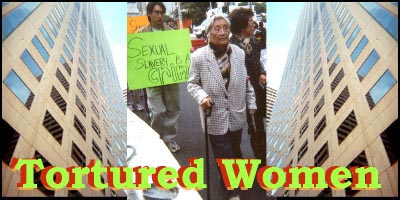Korean elder war victims demand apology from the Japanese government for torture
 |
|
by Joseph Bolden On a sun drenched, near cloudless day the weather is crispy cold, the air if not freezing has the possibility of turning dry ice-like with a cutting wind chill. The sun shines bright yellow-white but soon as you step into supposedly warm rays the illusion is gone. San Francisco’s wonderful weather has fooled me again-the sun’s radiant sheen isn’t what it appears. Protesters, photographers, newspeople recording, curious onloookers at ground level and above in a nearby hotel look on are all dwarfed by the 50 Fremont Center building, next to a huge skyscraper that dominates the now graying skies. Younger Asian female voices say loudly “Apologize.” Guess their Gov-ernment is just as stealthy, secretive, and cold as ours. [U.S.A.] Asians of differing nationalities walk in solidarity with two for-mer comfort women protecting them for the rush of press and audience outside the orange barriers, I now believe the barriers were not for stop-ping cars as much as protect the few brave elderly Asian women willing to speak about such a personal time in their lives. Ms. Kim must have related this part of past in full because on Fremont and Market Streets while standing was speaking about it but could not go on afraid, of the bullhorn that amplifies her voice may have fright-ened her, or her ordeal is still too fresh. even now to her. There are times I am truly glad not to be too professional concentrating only on the story if re-cording her or other survivors is all I get so be it; just being out here in public, to reveal her governments hidden, shameful secrets to America and in other countries takes more cour-age, determination, will, and soul than most of us ever care to admit or have. Protesters block off some traffic with bright orange barriers. [Confort Women is a euphemism for prostitute ] Many young girls are from the country, a few from cities all are turned into whores for the Japanese army hence the name Comfort Women. It is a disgraceful, horrendous story the Japanese Government does not want to reveal. Can they argue [“It was wartime, we had no choice, or other countries have no right to question are culture or customs - soldiers-men have needs or their military would be in chaos.” Could be some of the multiple replies or reasons the Japanese Government. Over fifty years! Were the Japanese Government waiting... Are they still waiting for every former Comfort Woman and their heirs or adopted children to die thereby keeping that shameful history secret forever? Its a good thing at this point in time that women nation wide live longer than men, maybe this is one the reasons why. So at some point as anger, wisdom, sensitivity outweighs fear the survivors come forward while most of the male perpetrator’s die off. How could this happen? Ms. Yuri Kochiyama, 79 years old in “It was a time - slavery in which some 200,000 women mostly Korean were cruelly victimized and abused must be told to the world, the Japanese Government must condemned and forced to pay reparations, an apology is meaningless decades and most of the victims are gone. Again young voices “THAT’S RIGHT REPARATIONS.” “Perhaps never in the history of war, [Yuri continues] has a na-tion so blatantly and massively organized a means of deceiving and kid- napping woman for the sole purpose of sexual abuse; imagine 200,000 women who knows how many were killed”? He few must be alive today, and many of Japan’s young generation is ignorant of the horrendous truth because its educational system have cov-ered up real history; the Japanese Government don’t want to admit what happened-I do not know why these war crimes were not brought up in the tribunal just after the war; the use of the terminology ‘COMFORT WOMEN’ is also insulting and misleading...” The Korean Women in Seoul? [Korea] “What Japan’s Imperial Army did through out Asia was devas-tating and despicable. We must all unite, assert our outrage at Japan human rights violations and in whatever way possible so such war time atrocities will never happen again.” Daisil Kim, an independent filmmaker and writer since 1988, Korea born Dai Sil Kim-Gibson came to the United States in 1962 to per- of America by new immigrants; Sa-l-Gu, literally April 29, a film about the 1992 Los Angeles crisis from the perspective of Korean woman shop- keepers; A Forgotten People: The Sakhalin Koreans, an hour documentary about the forced Korean laborers on Sakhalin island, initially indentured by Japan, then fell into the hands of the Soviet Union in 1945 and were for- gotten for half a century; and Olivia’s Story, a 14 minute drama, which is currently being cablecast on the Sundance Channel. All three documentaries were nationally broadcast on PBS and were distributed world wide. A recipient of many awards and grants, most recently she was awarded a Rockefeller Fellowship for Silence Broken, her most recent film. She also received an Asian American Media Award and the Kodak Film- maker’s Award for this film. An Author of many articles, Silence Broken: Korean Comfort Women is her first book. Hyejin seunim [pronounced Heh-Jeen, seunim is Korean for Bud-dhist monk.] Hyejin is the Executive Director of the House of Sharing in Ko-rea. Established in 1992 with support from Buddhist and social organi- za-tions, the House of Sharing offers residence, community and support for these elderly women, or “grandmothers.” The History Museum of the Japanese Military Comfort Women was built in 1998 on the grounds of the House of Sharing which serves as a clearinghouse of information and learn- ing about comfort women history. Hyejin has played an active role in raising international awareness to the movement for justice for former com A 50+ year old war still killing, silencing its victims long after the conflict has ended. Mrs. or Ms. Kim, Yuri, and others are right. |



